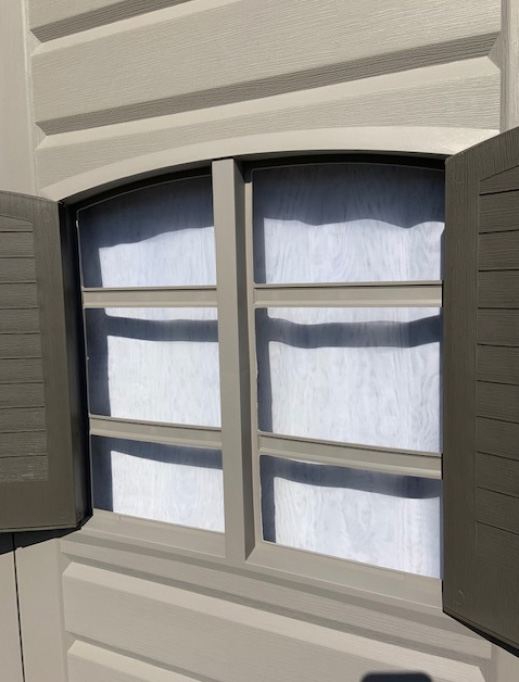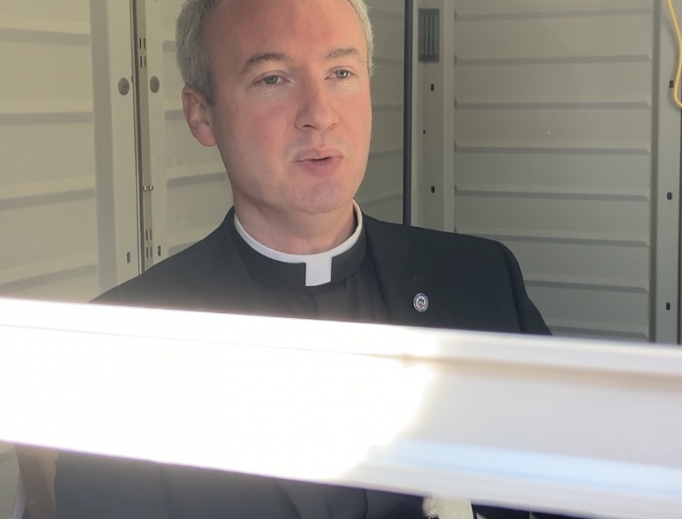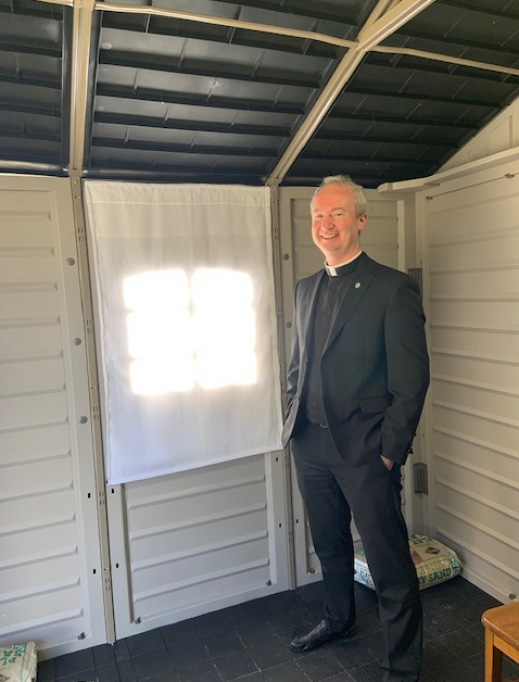In the Era of Coronavirus, Head to the Shed for Confession
With the coronavirus leaving churches closed across most of the nation, Father Daniel O’Mullane of Our Lady of Mount Carmel Parish in Boonton, New Jersey, says as the Body of Christ, we still have an essential mission, and he invites the faithful to his triage tent.

During this coronavirus quarantine, there’s not much that will take me out of my neighborhood, let alone my house. With a 6-month-old baby at home and a husband eager to make stealth grocery runs, I am grateful to work from home, especially since we live just west of Manhattan in New Jersey, two areas where the virus has been especially cruel.
But the news of a confession shed piqued my interest so much that I ventured out to visit Our Lady of Mount Carmel in Boonton, New Jersey, to talk with Father Daniel O’Mullane from his new digs — a shed purchased at Home Depot — now serving as his confessional.
Upon arrival, I have to say, it was hard to find. One figures it’ll be an eyesore plopped down in the middle of a grassy lawn or near the end of a parish parking lot, but Father O’Mullane knew a shed close to where the Lord is must be aesthetically pleasing.
“I wouldn’t have bought it if it was ugly,” Father O’Mullane flatly states.

The shed, tucked in directly to the left of the parish doors, is hardly recognizable at first. The color blends right into the stone façade of the church. Father O’Mullane said he’s not positive on what exactly inspired the idea, besides necessity being the mother of invention:
“I’m not exactly sure what sparked the idea. I had been seeing pictures of priests hearing confessions in all kinds of conditions and scenarios fit to the places they live. I wasn’t convinced I’d be able to make it happen the way they could: no real access to an exterior window, poor weather would prevent me from being outside, and little ability to make the process truly anonymous.”
Located in Boonton, New Jersey, just about a 30-minute drive to Manhattan, Our Lady of Mount Carmel parish is really within the epicenter of the coronavirus outbreak. And with the fear and anxiety over COVID-19, Father O’Mullane is doing everything he can to reach his flock. He says time is of the essence.
“For me, there’s a doubling down of urgency: urgent action, at least for our pastors. And I’m very thankful for that. There’s not a pastor out there who is not praying for his people now with more intensity than he ever has.”
Living with this heightened sense of risk and vulnerability, Father also sees a new hunger for the sacraments, especially the sacrament of reconciliation.
“People recognize a more urgent need for forgiveness — it’s forgiveness, but it’s mercy. It’s the mercy of God but then also the mercy of God equipping us to be merciful people. I think folks recognize that it’s become a little bit more difficult to be merciful people in this — in a new environment — on a new stage, so to speak.”
However working now from this new reality, Father O’Mullane says the need for the Gospel has not changed. Many of us are concerned, some even irate, over churches being closed, but he reminds us: We don’t have to wait for churches to be open to draw closer to Christ.
“My reflection for the Easter vigil was that we may be in a time of greater darkness, but in times of great darkness, Light draws us all the more close to itself. We are, say, in the coldness of our day-to-day; we have the fire and light of Christ that warms us, and sustains us, gives us orientation, right, because if it’s light in and among other perceived lights, then we might have a hard time sifting and sorting it out. And I think we’ve had that. But when everything goes dark, the light of Christ gives us that orientation more surely than before. And I think, again, that’s what God has on offer for us at this time. It’s just whether or not we’re able to seize the day.”
As Masses have been canceled and cities essentially locked down, the faithful have now turned to online Masses and prayers just like the ones Father O’Mullane offers daily, including a livestreamed Divine Mercy Chaplet marking Divine Mercy Sunday. He’s using every type of technology to reach his parishioners, even writing letters and doing robocalls for those cut off from the internet. Father O’Mullane says now, more than ever, the mission of the Church remains the same.
“Jesus is with us now. No matter what situation or circumstance we find ourselves in, Jesus wants to use this time to draw you closer to him and his way of life. I don’t think it’s ours to rail against reality … this is a time of serious blessing for anyone who’s open to it.”
As I listen to Father O’Mullane from the window of his confession shed, the sun beaming down on a very cool brisk morning, it becomes clear that this shepherd is intent upon not wasting this time we are given — not mulling over the roadblocks created by the coronavirus, but by turning them into opportunities for growth of the Gospel. Father O’Mullane says as a leader of his church, he must be there for his people.

“We have to be in people’s lives — we have to figure that out — and that’s not just a problem for pastors to figure out. That’s a problem for Christians to figure out. If we trust and follow Jesus, he’s going to lead us into community with other people. We have to be about that work today.”
The work Father O’Mullane is engaged in is what many of us see in the headlines on a daily basis as the coronavirus cripples thousands — leading many to an early death. In New Jersey alone, there are more than 85,000 confirmed cases, with more than 4,200 souls who have succumbed to the ravaging virus. Father O’Mullane spends a good part of his week anointing the sick at nearby hospitals.
“I am eager to anoint the sick. People who are diagnosed as having COVID-19 are especially thankful that I will come to see them, embrace them, anoint them, etc. They’re starving for human contact.”
Father O’Mullane also speaks directly with parishioners dealing with family members who have lost loved ones — his own friends and flock.
“I have friends whose grandparents passed; people who are working on the front lines. I like to think I’m on the front lines —this is something of a triage tent. Also nurses — their workload has increased — things they have to do on a regular basis are more traumatic for them.”
Father O’Mullane also understands that this new era of life under quarantine is affecting us all. He sees the despair we are all feeling in this new unsolicited solitude.
“We are grieving. We’re grieving that lost future with the people that we love, but we’re all grieving now because we don’t know what the future holds for us. And so we are even now grieving a lost future, a lost future together.”
He says emphatically, like Jesus, we were made for community and not to be alone.
“We’re all victims — we’re suffering from isolation. We need human contact. That’s one of the reasons why a shed or any other way to be personally present with people in a safe way is so essential and so important. We are social beings. Jesus honors that, as well. It’s not a sociological reality; it’s a theological reality. We are made for each other. From the Garden we see it — and it doesn’t change with the Fall. We are made for community. God himself is a community of persons, and we are made in his image and likeness. Community is essential for us.”
The word “essential” has been thrown about today in this hyper-coronavirus world we are in, applied to things such as grocery stores, liquor stores and even abortion. Currently states and countries around the world are debating why churches have not been granted the same distinction. But Father O'Mullane says even with his parish doors locked, the mission remains the same.
“We still have an essential mission. We are still the Body of Christ. We still have work to do. And God is equipping us to do that work.”
The opening of Father O’Mullane’s confession bungalow (after visiting, the word “shed” just doesn't do it justice) has seen hundreds of his parishioners come through for the sacrament of penance. Parishioner Joanne Parent offers her own reflection on her visit and the opportunities this priest is creating for the faithful:

“Father Daniel’s new and innovative ways of staying connected to our parish community have been a source of great inspiration for me. Our parish mission is to be ‘a light to the world.’ Father Daniel’s great acts of love for his parish family have brought this mission to life for us. During these dark days of isolation, fear and uncertainty, access to the sacrament of reconciliation has been a beautiful ray of light, bringing us hope and strength. I was fortunate to experience the sacrament of reconciliation at the shed twice since we’ve been under quarantine. Receiving the love, mercy and grace of God in such a tangible and powerful way has strengthened me to be a better wife and mother at home. It has brought my whole family greater peace. For this we are grateful beyond measure to Father Daniel.”
I was also buoyed by my visit to see Father O’Mullane. His reverence for the sacraments is heartwarming. And his ability to look for opportunities of growth and understanding in a world that often looks dim opens our own eyes to the wonder and amazement of how God is still ever present within our lives, even as we are craving the Eucharist. Father O’Mullane says the coronavirus crisis is bringing to light a truth that many of us easily forget: We are not in control.
“One of the experiences of this whole thing is that we’ve lost our foothold. We were living under the illusion that we were in control of our lives, and this has woken us up to a different reality. But what does that mean? I think more prayer — more fervent prayer, more sincere prayer; trusting God, when we abandon ourselves, that he is in control.”
And as we enter into our second week of the Easter season, we cling to our faith and try our best to have hope after a very dark Lent. Father O’Mullane reminds us that our idea of hope is only a sliver of what God has in store for us, even amid the coronavirus pandemic:
“We hope for the best, but the hope that God is providing is not a hope for the best. The hope that God’s providing is that he has work for us to do, and we can participate in his mission here and now. There’s nothing at all that prevents us from living hopeful lives — because God’s got this.”
Amen, Father. Amen.
- Keywords:
- alyssa murphy
- boonton
- confession
- coronavirus
- covid
- father daniel o'mullane
- new jersey
- our lady of mount carmel
- shed


















